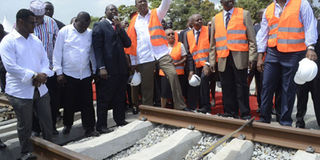Too many issues remain unresolved on the standard gauge railway saga

PHOTO | FILE President Uhuru Kenyatta (pointing), Deputy President William Ruto (2nd right) and Coast leaders at the launch of the standard gauge railway line at Changamwe on November 28, 2014.
What you need to know:
- Let us bury, once and for all, any attempts to camouflage or rush through with indecent haste any project, big or small, or in this case gargantuan.
- Can we really afford such an amount and will the country and its economy get any value for money? Indeed could it ever be commercially viable with such a massive cost base?
The saga of the standard gauge railway is taking on new twists and turns as each day goes by with the figures and projections getting larger and larger.
For the country’s wellbeing and the economy, this exposure and debate are necessary.
First, it is the paramount right of Kenyans to get full information, feedback and accountability for every shilling spent on their behalf.
Let us bury, once and for all, any attempts to camouflage or rush through with indecent haste any project, big or small, or in this case gargantuan.
To get a more thorough take on this saga, it is important to start by asking whether there is an actual need for a new railway.
The current railway only carries around five per cent of all cargo. This is an appallingly low and embarrassing figure. But this is not surprising, considering the poor management coupled with overt government and political interference it has been subjected to over the years. It is a rundown, hobbling relic of antique dimensions.
At the same time, a major artery of the economy is its hub status in a region where, with the current exception of South Sudan, the economies are growing at a fast pace.
Kenya, through its port of Mombasa and other supporting infrastructure, is the gateway for much of the imports and exports of the region, as well as being a major supplier of goods, services and skills.
For a long time, an overriding complaint by these countries has been the time it takes and the expense incurred ferrying goods to and from Mombasa. We can move goods halfway across the world more cheaply than, for example, doing it from Mombasa to Kigali.
Yes, there is an urgent need for a modern, professionally run railway and port with expandable capacity. It can be equally argued that the current railway is just not worth investing vast amounts of money in it because that would translate into a virtually total overhaul and the equivalent of a new railway anyway.
But how that is achieved is what is sorely in question now. Was the exercise in selecting what entity to do the feasibility study, design and costing done transparently? How professional were these undertakings and were key stakeholders involved?
Another equally important question is, was it subject to such hard-headed but fundamental questions as to what the country can afford as well as the relevant cost-benefit analyses?
The former may sound obvious, but one does not go out and pay any price for something, however, much it is needed. If an individual does that, he runs the risk of going bankrupt.
We are now being told that the price tag has risen from Sh220 billion to Sh327 billion, and now to Sh447.5 billion, and that the financing cost will be in the region of Sh200 billion.
Based on the Sh327 billion figure, it was projected that our external debt alone would rise by 17 per cent from Sh1.9 trillion to Sh2.23 trillion.
Can we really afford such an amount and will the country and its economy get any value for money? Indeed could it ever be commercially viable with such a massive cost base?
Our external debt, although not outrageous, is high. Most alarming is how fast it is rising.
Then there is the separation of functions. It is against all standard ethical practices to award the setup that did the feasibility study, designed the project and did its costing with the contract to do the actual job as well, especially when there has been no competitive tendering.
Transport Secretary Michael Kamau cannot be serious when he says the government did not break the procurement law by not subjecting this project to competitive bidding because this is how it is done in China and so Kenya must do it that way!
Last, but as important, is the need to thoroughly work out who and what will be responsible for operating such a major venture inclusive of all the relevant good commercial practices and how its operation will be accountable to all Kenyans and partner states.
To spend such a lot of money is one thing. To run it efficiently is the other half of the challenge.
To thoroughly review and scrutinise this project now and revise where necessary is absolutely vital. To carry on blindly with the government thinking it can talk its way out of the mess is a recipe for disaster with severe macroeconomic consequences.
Mr Shaw is a Nairobi businessman. ([email protected])





